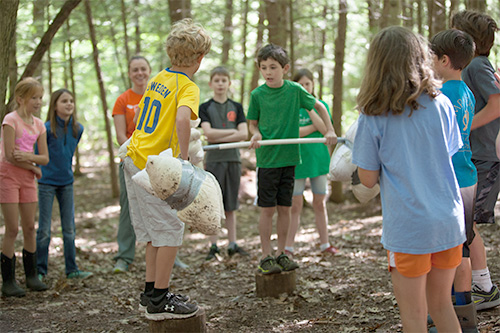
By Angela Hanscom
Three young boys and two girls scramble up a large dirt hill, almost in unison. One boy gets to the top first and screams, “King of the hill!” Another child laughs and playfully pushes the boy aside, “No. I’m king of the hill!” Each child takes a turn trying to be king of the hill. Laughter rings through the woods as they play this game – covered in dirt, from head to toe. Adults watch this playful scene from a safe distance, many of them with a smile on their face.
Most of us fondly remember playing similar games growing up. Rough and tumble play, also known as “big body play,” roughhousing, horseplay, or play fighting comes in many forms, such as wrestling, rolling around, climbing on top of each other, pretending to fight, superhero play, and chase games. In its more organized forms, we see games like: King of the Mountain, Red Rover, Steal the Bacon, Duck-Duck-Goose, and Freeze Tag.
Rough and tumble play is something that is enjoyed here at TimberNook, both by the observant adults and the children, but is certainly not celebrated in many programs today. The fear of producing “aggressive children” often limits or restricts this form of necessary play both in the home and in the school environments. From the 1960’s through the 1990’s, it was actually thought that observing or imitating others in this sort of play inspired aggressive and hostile behavior. Roughhousing was discouraged, and early childhood programs were encouraged to “defuse rough play before it becomes a problem” (Council for Professional Recognition 2007, 31).
Recent research has been proving the contrary: that rough and tumble play does not produce aggressive children (Klein, 2010). In fact, restricting “big body play” can have detrimental affects on the growing child. More and more children are starting to have trouble regulating how much force to use when playing games like tag and other chase games. Tag in some schools is being banned because children are getting “more aggressive.” Teachers are also reporting that kids “can’t seem to keep their hands off each other” during recess sessions. Why is this happening? There has been a significant decline in the amount of unrestricted outdoor free play children have on a regular basis, and rough and tumble play is becoming all but extinct.
Lack of rough and tumble play reduces the opportunities for rich, proprioceptive (“heavy work”) experiences necessary to develop and fine-tune the senses in the joints and muscles. This is why occupational therapists will often recommend that parents wrestle with their children. Children benefit from “roughhousing” with family and friends to develop strength, the senses, and control of both. Children learn how to calibrate and regulate their movements when wrestling children and adults of varying ages and abilities. For instance, an older child may purposefully be more gentile when wrestling with a much younger child.
Rough and tumble play also allows children to explore changing their positions in space, learning the limits of their strength, controlling impulses, regulating fear and anger, finding out what other children will and will not let them do, and working out social relationships as they play roles, take turns, and sort out personal boundaries (Raising Children Network, 2010).
Young children enjoy very physical play. And for good reason! It is a basic human instinct to play fight, test limits, and gain new skills. Instead of letting fear get in the way, we need to allow for all types of play – not just those that are calm, quiet, and “safe.” Our children need to challenge their senses, motor skills, and abilities in order to organize the brain and develop new skills in life. It is our job to provide the time, space, and opportunity to do so.
References:
Council for Professional Recognition. 2007. “Methods for Avoiding Problems Are Implemented.” CDA Assessment Observation Instrument. Washington, DC: Author.
“Elementary School Bans Tag for Being Too Rough.” Fox News.
https://nypost.com/2017/03/15/elementary-school-bans-tag-for-being-too-rough/ 15 March 2017.
Klein, Kevin. “Why Boys Need Rough-and-Tumble Play.” Babyzone.com. https://www.babyzone.com/toddler_preschooler_fun/Play/article/boys-need-rough-tumble-play. 10 Nov. 2010.
“Rough-and-tumble play.” Raising Children Network. https://raisingchildren.net.au/articles/rough_and_tumble_play.html. 10 Nov. 2010.h
